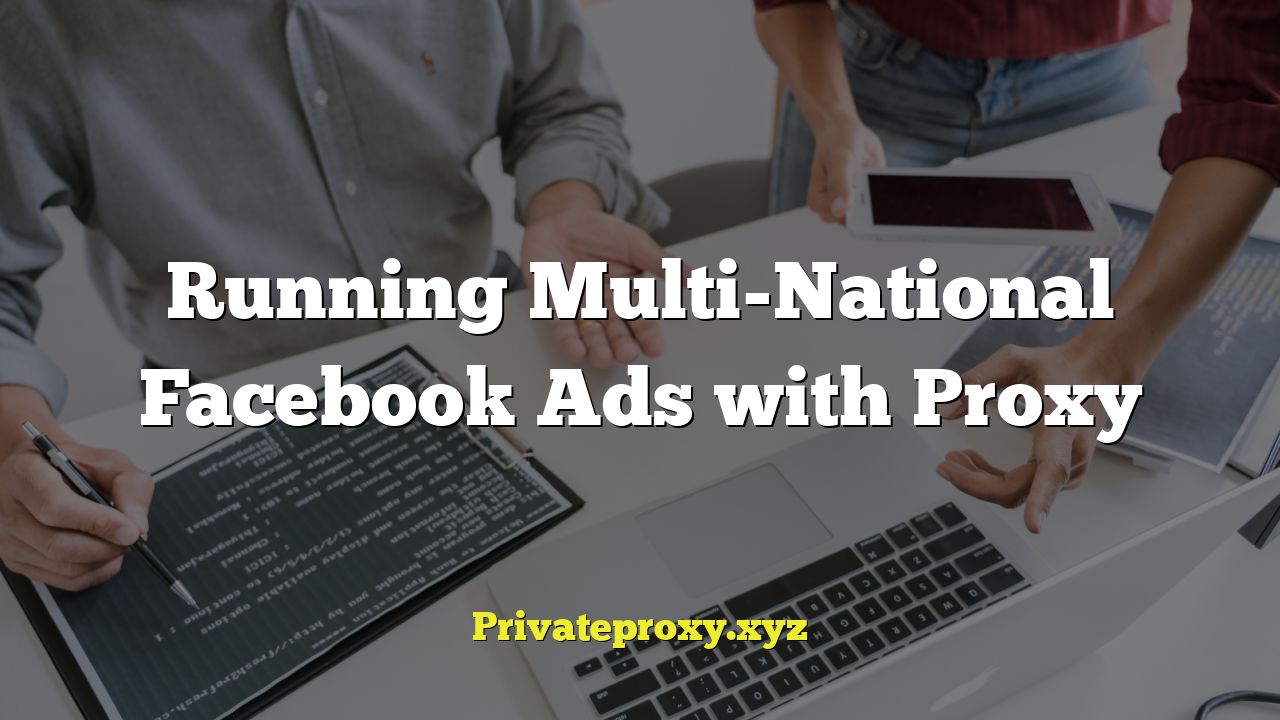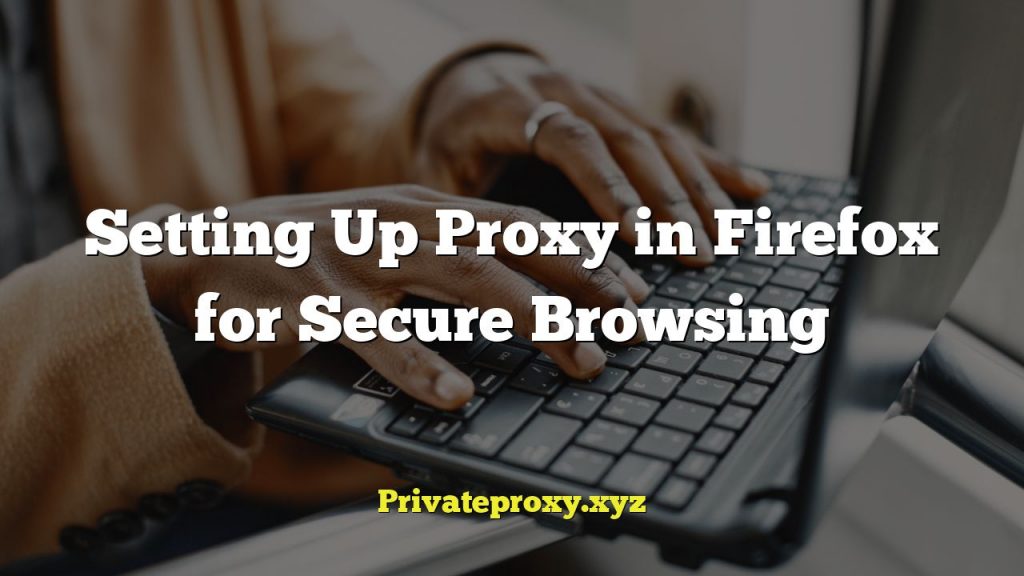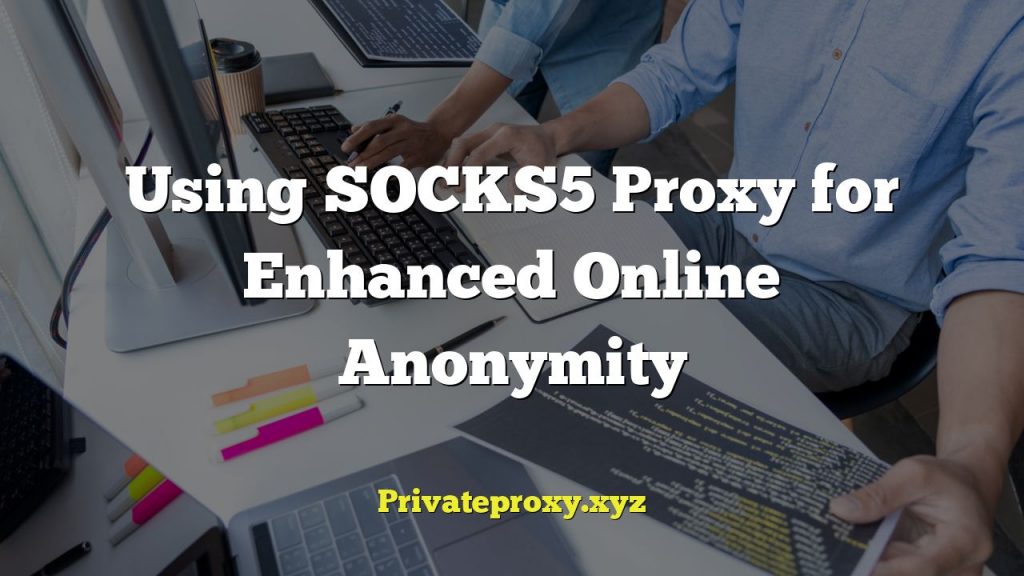
“`html
Understanding the Landscape: Multinational Facebook Ads and Proxy Servers
Facebook advertising offers unparalleled reach, connecting businesses with billions of potential customers worldwide. However, managing campaigns across multiple countries presents unique challenges. From adhering to diverse cultural norms and legal regulations to optimizing for varying ad costs and user behaviors, a successful multinational Facebook ad strategy requires meticulous planning and execution. Proxy servers, though often associated with anonymity or circumventing restrictions, can play a legitimate and valuable role in streamlining and optimizing these global advertising efforts.
This article delves into the complexities of running Facebook ads across multiple nations and explores how strategically utilizing proxy servers can enhance your campaign’s effectiveness. We will cover various use cases, technical considerations, and best practices to ensure your international advertising ventures are both efficient and compliant.
Why Consider Proxies for Multinational Facebook Advertising?
While proxies aren’t mandatory for running multinational Facebook ads, they offer several compelling advantages that can significantly improve campaign performance and management. Here are some key reasons to consider incorporating proxies into your strategy:
- Accessing Country-Specific Insights: Facebook’s ad platform provides detailed demographic and behavioral data, but this data can vary significantly from country to country. Proxies allow you to simulate browsing from different locations, enabling you to access and analyze location-specific ad previews, competitor campaigns, and pricing information, providing valuable insights for crafting targeted strategies.
- Bypassing Geo-Restrictions: Certain ad features, product offerings, or content types may be restricted in specific regions due to legal or regulatory constraints. Proxies can help bypass these restrictions for research and analysis purposes, allowing you to understand the competitive landscape and identify potential opportunities, although it’s crucial to ensure your actual campaigns adhere to all local regulations.
- Account Management and Security: Managing multiple Facebook ad accounts from the same IP address can raise red flags and potentially lead to account suspensions. Using different proxies for each account can mitigate this risk by providing unique IP addresses, making it appear as though each account is being managed from a different location. This can be particularly important for agencies managing numerous client accounts across various countries.
- Ad Verification and Quality Assurance: Ensure your ads are displayed correctly and targeting the intended audience in each region. Proxies allow you to manually verify ad placement, language accuracy, and overall user experience from different geographical locations, guaranteeing consistency and quality across your international campaigns.
- Price Comparison and Ad Cost Optimization: Ad costs on Facebook fluctuate based on factors such as competition, audience demographics, and time of day. By using proxies to simulate bidding from different locations, you can gain insights into cost variations and optimize your bids to achieve the best possible return on investment in each target market.
Types of Proxies and Their Suitability for Facebook Ads
Choosing the right type of proxy is crucial for successful and efficient Facebook ad management. Different proxy types offer varying levels of anonymity, speed, and reliability. Understanding these differences is essential for making an informed decision.
- Datacenter Proxies: These proxies originate from data centers and are typically the cheapest and fastest option. However, they are also the most easily detectable, making them unsuitable for tasks requiring high anonymity, such as managing multiple Facebook accounts. Facebook is adept at identifying and blocking datacenter IP addresses, so using them can lead to account suspensions.
- Residential Proxies: Residential proxies are assigned to actual residential IP addresses, making them significantly more difficult to detect than datacenter proxies. They offer a higher level of anonymity and are generally more reliable for managing multiple Facebook accounts or accessing geo-restricted content. However, they are also more expensive than datacenter proxies.
- Mobile Proxies: Similar to residential proxies, mobile proxies use IP addresses assigned to mobile devices. They are considered highly reliable and offer excellent anonymity due to the constant rotation of IP addresses by mobile carriers. Mobile proxies are often the preferred choice for managing sensitive tasks like account creation and large-scale data scraping, but they are typically the most expensive option.
- Shared Proxies: Shared proxies are used by multiple users simultaneously, making them a cost-effective option but also increasing the risk of detection. If one user engages in prohibited activities, the shared IP address may be blacklisted, affecting all users sharing that proxy. Shared proxies are generally not recommended for managing Facebook ad accounts.
- Dedicated Proxies: Dedicated proxies are assigned to a single user, providing a higher level of security and reliability. They offer better performance than shared proxies and are less likely to be blacklisted. Dedicated proxies are a good option for managing a small number of Facebook ad accounts.
Recommendation: For most multinational Facebook advertising tasks, residential or mobile proxies are the most suitable options due to their superior anonymity and reliability. Datacenter proxies should be avoided due to the high risk of detection and account suspensions.
Setting Up and Configuring Proxies for Facebook Ads
Implementing proxies for Facebook advertising involves several steps, from selecting a reputable proxy provider to configuring your browser or automation tools to use the proxy server. Here’s a detailed guide to help you get started:
- Choose a Reliable Proxy Provider: Research and select a proxy provider with a proven track record of providing high-quality residential or mobile proxies. Look for providers that offer specific targeting options, such as country and city-level targeting, and ensure they have a responsive customer support team.
- Purchase Proxy Subscriptions: Determine the number of proxies you need based on the number of Facebook ad accounts you manage and the tasks you intend to perform. Consider purchasing proxies with sufficient bandwidth to handle your data transfer needs.
- Configure Your Browser: Most web browsers allow you to configure proxy settings directly. You can typically find these settings in the browser’s options or preferences menu. Enter the proxy server address (IP address and port number) and any required authentication credentials (username and password) provided by your proxy provider.
- Use Proxy Management Tools: For managing multiple proxies and accounts, consider using a proxy management tool or browser extension. These tools allow you to easily switch between different proxies and manage your online identities. Popular options include Proxy SwitchyOmega (Chrome extension) and FoxyProxy (Firefox extension).
- Integrate Proxies with Automation Tools: If you’re using automation tools for tasks like ad creation or data scraping, ensure that the tools support proxy integration. Configure the tools to use your proxy servers for all requests.
- Test Your Proxy Connection: After configuring your proxy settings, verify that your connection is working correctly. You can use online IP address lookup tools to confirm that your IP address matches the location of your proxy server.
Best Practices for Using Proxies with Facebook Ads
Using proxies effectively requires adhering to certain best practices to minimize the risk of detection and ensure optimal performance. Here are some key guidelines to follow:
- Rotate Proxies Regularly: To further enhance anonymity and prevent detection, rotate your proxies regularly. Change your proxy IP address every few hours or daily, depending on the frequency of your activity.
- Mimic Human Behavior: Avoid sending automated requests at a rapid pace, as this can raise suspicion and trigger security measures. Mimic human browsing behavior by introducing delays and varying your activities.
- Use Different User Agents: Each web browser sends a “user agent” string that identifies the browser and operating system to the web server. Using different user agents for each proxy can help further diversify your online identity.
- Clear Cookies and Cache Regularly: Cookies and cached data can reveal your true location and browsing history. Clear your browser’s cookies and cache regularly to maintain anonymity.
- Monitor Proxy Performance: Regularly monitor the performance of your proxy servers, paying attention to speed, uptime, and reliability. If you experience frequent disconnections or slow speeds, consider switching to a different proxy server.
- Comply with Facebook’s Terms of Service: While proxies can be used to enhance your advertising efforts, it’s crucial to ensure that you comply with Facebook’s terms of service and advertising policies. Avoid using proxies to engage in activities that violate these policies, such as creating fake accounts or promoting prohibited content.
- Implement Error Handling: When using proxies in automated scripts, implement robust error handling to gracefully handle proxy failures or connection issues. This will prevent your scripts from crashing or generating inaccurate data.
Legal and Ethical Considerations
While using proxies for Facebook advertising can be beneficial, it’s essential to be aware of the legal and ethical implications. Here are some key considerations:
- Transparency: Be transparent about your use of proxies to your team and any relevant stakeholders. Clearly communicate the purpose and benefits of using proxies and ensure that everyone is aware of the potential risks.
- Data Privacy: When collecting data through proxies, adhere to all applicable data privacy regulations, such as GDPR and CCPA. Ensure that you obtain consent from users before collecting their data and that you handle their data responsibly and securely.
- Compliance with Local Laws: Ensure that your advertising campaigns comply with all local laws and regulations in each target market. This includes advertising standards, consumer protection laws, and data privacy regulations.
- Avoid Deceptive Practices: Do not use proxies to engage in deceptive or misleading advertising practices. Be truthful and transparent in your advertising claims and avoid making false or unsubstantiated claims.
- Respect Copyright and Intellectual Property: Do not use proxies to infringe on the copyright or intellectual property rights of others. Obtain permission before using copyrighted material in your advertising campaigns.
Troubleshooting Common Proxy Issues
Despite careful planning and configuration, you may encounter issues when using proxies for Facebook advertising. Here are some common problems and their potential solutions:
- Proxy Not Working: Verify that your proxy settings are correct and that your proxy server is online. Check your firewall settings to ensure that they are not blocking the proxy connection. Try using a different proxy server to see if the issue is with the proxy itself.
- Slow Connection Speed: Slow connection speeds can be caused by a variety of factors, including network congestion, proxy server overload, or distance from the proxy server. Try using a proxy server located closer to your actual location. Upgrade to a faster proxy plan with more bandwidth.
- Facebook Blocking Proxies: Facebook actively detects and blocks proxies. If your proxies are being blocked, try using residential or mobile proxies, rotating your proxies more frequently, and mimicking human browsing behavior.
- Authentication Errors: Double-check your proxy authentication credentials (username and password) to ensure they are correct. Contact your proxy provider to verify that your account is active and that there are no issues with your subscription.
- Geolocation Issues: If your IP address is not matching the expected location, clear your browser’s cache and cookies. Verify that your proxy provider is offering accurate geolocation data. Try using a different proxy server in the desired location.
Conclusion
Running multinational Facebook ads effectively requires a strategic approach and a keen understanding of the nuances of each target market. While not a mandatory component, proxy servers can provide valuable assistance in accessing country-specific insights, managing multiple accounts, and ensuring ad quality across different regions. By carefully selecting the right type of proxy, configuring it correctly, and adhering to best practices, you can leverage proxies to optimize your international advertising campaigns and achieve greater success on Facebook’s global platform. Remember to prioritize ethical considerations and comply with all applicable laws and regulations to maintain a positive and sustainable advertising presence.
“`


